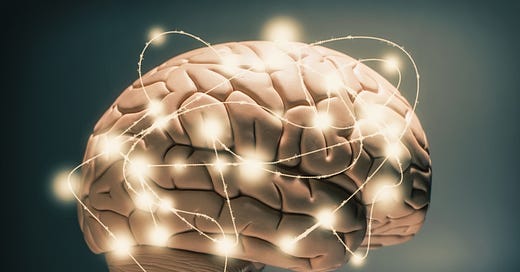Second Excerpt From The Edge of Knowledge: The Hard Problem of Consciousness
Consciousness is notoriously slippery as demonstrated by both philosophical analysis and empirical testing.
When I was young, I quickly became entranced by science, by the possibilities of the universe, and by the possibilities of being involved in making discoveries about the universe. Being the first person in the world to understand something fundamental felt, for me, like the greatest adventure anyone could ever hope to have.
The first field I focused on was what today would be called neuroscience. For me, nothing seemed like a greater challenge than understanding the brain. In many ways, it still does.
I didn’t think about neuroscience per se, because I had never heard of that term or that field. My mother had big plans for me and my brother. He would be a lawyer, and I would be a doctor. He did become a lawyer. My plan was to become a brain surgeon, because I thought a doctor was as close to being a scientist as anyone could be.
Needless to say, I never became a doctor, and I also didn’t become a neuroscientist (though I toyed with it from time to time when depressed in graduate school). What neuroscience filtered down to me seemed like taxonomy, discovering what the parts of the brain were, but not really understanding exactly how any of them worked and, more importantly, how they worked together to produce thought. It just seemed hopelessly complicated. And once again, in many ways, it still does.
Nevertheless, as with many fields of science that I chose not to study, the past half century has seen revolutionary changes in our understanding of the brain, based largely on the development of new tools to probe the brain. We can probe single neurons, observe a thinking brain in action with functional magnetic resonance imaging (MRIs), read out data that in certain cases allow us to predict what a person is seeing or even thinking about, explore the perceptions of individuals with known brain damage, and even interface human brains with mechanical devices to try and allow individuals to move limbs they previously couldn’t move.
Yet the mysteries that captivated me, and I suspect captivate all of us, still remain largely unresolved. What makes us us? How do we come to model the world and ourselves within it, predict it with foresight, and reflect upon it and our own existence afterwards? What makes us self-aware? Are we the only animals who are? There is perhaps no deeper personal mystery in the universe, yet perhaps no subject presents more obstacles to human exploration…
…The different perspectives presented by neuroscientists are illuminating because they reflect how different selection strategies from amongst the growing wealth of data in this field point toward different possible solutions of what the Australian philosopher David Chalmers coined “the hard problem of consciousness”—how physical processes in the brain associated with storing and processing sensory data through biochemical reactions produce a mental image of the world and of ourselves that governs how each of us live our lives…
Keep reading with a 7-day free trial
Subscribe to Critical Mass to keep reading this post and get 7 days of free access to the full post archives.




